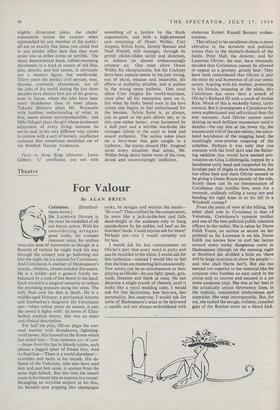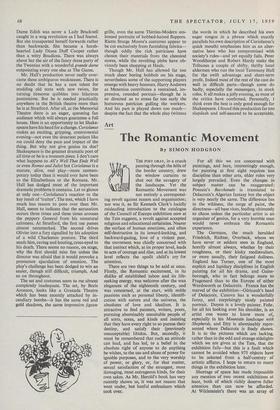Theatre
For Valour
By ALAN BRIEN
(.....01? ,..„)) Coriolanus. (Stratford- --.., ,?, upon-Avon.) —1 r SIR. LAURENCE OLIVIER is the most be-medalled of all our heroic actors. With his r=--- smouldering, arrogant good looks, his trumpet resonant voice, his restless muscular ease of movement as though at a flourish of tuckets he might hack his way through the scenery and go hallooing out into the night, he is a natural for Coriolanus. And Coriolanus is another of Shakespeare's touchy, choleric, absent-minded fire-eaters. He is a soldier and a general fatally un- balanced by a rush of hot blood to the head. Each wound is a surgical necessity to reduce the pounding pressure along the veins. The only final cure for him is death. He is a middle-aged Hotspur, a puritanical Antony and Enobarbus's diagnosis fits Coriolanus too—'when valour preys on reason, it eats the sword it fights with'. In terms of Eliza- bethan medical theory, this was an exact and clinical description.
For half the play, Olivier plays the war- mad warrior with thunderous, lightning- vivid power. His farewell to the Rome which has exiled him—`You common cry of curs' —drops from his lips in bloody icicles, each phrase a jagged spear of frozen fury. And its final line—`There is a world elsewhere'— crumbles and melts in his mouth. His de- fiance of the Volscians, who also have used him and cast him aside, is spoken from the same high hillock. But this time the breath roars in his throat like an express in a tunnel. Strangling an invisible serpent in his fists, his hooded eyes popping like champagne
corks, he savages and worries the insult- `Ba-o-oy?' Then stabbed by the conspirators, he rears like a jack-in-the-box and falls dead-weight at the audience only to hang upside-down by his ankles, red beef on his butchers' hook. Could anyone ask for more? Perhaps not—but I would certainly ask for less.
I would ask for less consciousness on Olivier's part that every word is putty and can be moulded to his whim. I would ask for less technique—instead I would like to feel that the lines are mastering him occasionally. Few actors can be so simultaneous in their playing as Olivier—he can fight, speak, grin, wink, threaten and think at once. He can decorate a single crumb of rhetoric until it looks like a royal wedding cake. I would ask for less decoration, less bravura, less personality, less expertise. I would ask for some of Shakespeare's arias to be delivered a capella and not always embroidered with
elaborate Robert Russell Bennett orches- trations.
This refusal to let excellence alone is more obtrusive in the domestic and political scenes than in the rhubarb-rhubarb of the battle. Peter Hall, the director, and Sir Laurence Olivier, the star, have obviously decided that Coriolanus cannot be allowed to appear as a grumpy, grizzly bear. They have both remembered that Olivier is also the most sly and humorous of all our comic actors. Arguing with his mother, protesting to his friends, snapping at the plebs, this Coriolanus has more than a smack of Olivier's Richard III with a touch of Archie Rice. Much of this is wickedly funny, tartly ironical. But it presupposes a Coriolanus far more sophisticated and self-critical than the text warrants. And Olivier cannot resist shining up each brilliant mannerism until it dazzles—the coy bite at the lower lip, the exasperated roll of the eye-whites, the calcu- lated boyishness of the wagging head, the insultingly over-precise tonguing of the syllables. Perhaps it was only that one costume with the brief skirt and the flatter- ing neckline that would have seemed pro- vocative on Gina Lollobrigida, topped by a handsome curly head and supported by the loveliest pair of thighs in show business, but too often here and there Olivier seemed to be giving a Green Room parody of the role. Surely there can be no interpretation of Coriolanus that justifies him, even for a moment, suddenly rolling a saucy eye and bending his right knee in to his left in a Windmill curtsey?
From the point of view of the billing, the other chief role in Coriolanus is that cf Volumnia, Coriolanus's vampire mother and one of the best political public relations officers in the racket. She is taken by Dame Edith Evans, an actress as secure on her pedestal as Sir Laurence is on his. Dame Edith too knows how to curl her larynx around every tricky dangerous curve in Shakespeare (though on the opening night at Stratford she skidded a little on 'there will be large cicatrices to show the people'— and who shall blame her?). But she too seemed too superior to her material like the conjuror who fumbles an easy catch in the circus only to recover and succeed in a yet more awesome trick. She was at her best in the artistically artless throwaway lines, in the realistic, unexpected tendernesses and asperities. She wept incomparably. But, for me, she lacked the savage, ruthless, cannibal guts of the Roman mum on a blood kick. Dame Edith was never a Lady Bracknell caught in a wog revolution as I had feared. But she transported herself forwards rather than backwards. She became a harsh- hearted Lady Diana Duff Cooper rather than a witty Boadicea. There was always about her the air of the fancy dress party of the Twenties with a wonderful grande dame outpointing every one else at The Game.
Mr. Hall's production never really over- came these ambiguous weaknesses. There is no doubt that he has a rare talent for studding old texts with new twists, for turning tiresome quibbles into hilarious pantomime. But he is needed practically anywhere in the British theatre more than he is at Stratford. After all, at the Memorial Theatre there is an eager, queueing fan audience which will always guarantee a full house. Here is an opportunity to let Shake- speare have his head for a change. Coriolanus makes an exciting, gripping, controversial evening—not even the dreariest pedant like me could deny the pace and impact of the thing. But why not give genius its due? Shakespeare is the greatest dramatic poet of all time or he is a museum piece. I don't care what happens to All's Well That Ends Well or even Romeo and Juliet but Coriolanus is a mature, alive, real play—more contem- porary today than it would ever have been to the Elizabethans or the Romans. Mr. Hall has dodged most of the important dramatic problems it contains. Let us glance at only one—Coriolanus's reaction to the key insult of 'traitor'. The text, which I have much less reason to pore over than Mr. Hall, seems to indicate that the accusation occurs three times and three times arouses the peppery General from his unnatural calmness. At Stratford, the first use passes almost unremarked. The second drives Olivier into a fury signalled by his adoption of a wild Charleston posture. The third sends him, raving and hooting, cross-eyed to his death. There seems no reason, on stage, why the first should miss fire unless the director was afraid that it would provoke a premature ejaculation of emotion. The play's challenge has been dodged to win an easier, though still difficult, triumph. And so on throughout.
The set and costumes seem to me almost completely inadequate. The set, by Boris Aronson, looks like a Granada Theatre which has been recently attacked by in- cendiary bombs—it has the same red and gold shadows, the same impressive jigsaw grille, even the same Thirties-Modern em- bossed portraits of bobbed-haired flappers. Riette Sturge Moore's costumes appear to be cut exclusively from furnishing fabrics— though oddly the rich patricians have chosen their materials from the cheesiest stores, while the revolting plebs have ob- viously been shopping at Heals.
Though Mr. Hall has allowed far too much sheer boring hubbub on his stage, nevertheless some of the supporting players emerge with heavy honours. Harry Andrews as Menenius contributes a restrained, im- pressive, rounded portrait—though he is so directed as to stress far too early the humorous patrician gulling the workers. And his part is played down too much— despite the fact that the whole play (witness the words in which he described his own eager tongue in a phrase which exactly parallels his own description of Coriolanus's quick mouth) emphasises him as an alter- native hero who has compromised with society's rules—and yet equally fails. Peter Woodthorpe and Robert Hardy make the Tribunes a couple of shifty, thrifty local aldermen who run the local Tammany Hall for the swift advantage and short-term profit. Indeed most of the rest of the cast do well in difficult parts—though some do badly, especially the messengers, in stock roles. It all makes a jolly evening, as most of the critics have confirmed. Personally, I think even the best is only good enough for Shakespeare. I found this production far too slapdash and self-assured to be acceptable.







































 Previous page
Previous page